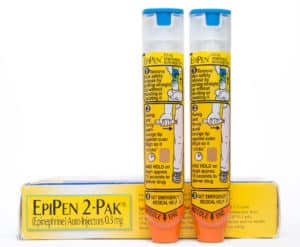Understanding the Role EpiPens Play in Urban and Wilderness Settings
April 29, 2021
For those who suffer severe allergic reactions to everything from wasp stings to wheat consumption, getting help — and getting that medical intervention fast — may mean the difference between life and death.
Here at The National Center for Outdoor & Adventure Education (NCOAE), we train our Emergency Medical Technician (EMT) students and Wilderness First Responder (WFR) students in the use of EpiPen, an autoinjector for those suffering a sudden anaphylaxis reaction.
This somewhat imposing emergency medicine tool is an injection device that contains epinephrine, a chemical that narrows blood vessels and opens airways in the lungs. A promptly administered injection may reverse severe low blood pressure, a rash or itchy skin, an alarming shortness of breath, hives, nausea, vomiting, and other symptoms of an allergic reaction.
Anaphylaxis is a life-threatening allergic reaction that requires immediate treatment, whether within the city limits or deep in the backcountry.
And while most anaphylaxis reactions are mild and self-limiting, it is impossible to predict — at least in the beginning — whether a reaction will become life-threatening. As a result, rapid intervention is always critical. A hiker’s risk for anaphylaxis increases if they suffer asthma that is severe or not controlled. Medical conditions such as heart disease can also increase the risk of an episode.
What can trigger an anaphylaxis episode?
The following are among of the most common causes of anaphylaxis:
- Milk, peanuts, tree nuts, eggs, shellfish, wheat, and soy
- Stings from bees, wasps, or fire ants
- Antibiotics, NSAIDs, or aspirin
- Latex
Adrenaline is the first line treatment for anaphylaxis and is most often administered using an autoinjector such as the EpiPen or drawn from a vial using a needle and syringe. EpiPen autoinjectors are available in two sizes — one for young children and another for those weighing more than 66 pounds. Since epinephrine is a prescription medication, anyone with a history of severe allergic reactions should have a prescription and the device at hand.
However, in many states — including North Carolina — businesses such as schools, summer camps, and daycare facilities often have prescribed doses of epinephrine on hand. Here at NCOAE, we train our staff members as well as our EMT and WFR students to recognize and treat patients in emergency situations.
Hesitation is hazardous
If you’re authorized and trained in its use, EpiPen injection should be administered as soon as symptoms are confirmed, and anaphylaxis is suspected. Delay of even a few minutes can mean the difference between a successful intervention and tragedy. And while it’s understandable that jabbing a needle into somebody’s leg through clothing can sound extreme, with proper training — and the desire to save a life — the task is much more palatable.
It’s true that the injection can be tough on the heart, but so are many of the above-mentioned symptoms of anaphylaxis. Side effects from the injection may include skin pallor (unusual lightness of skin color compared with normal complexion), headaches, dizziness, and increased heart rate, nausea, and anxiety.
So, while treating a patient with anaphylaxis can be difficult even for veteran EMTs and Wilderness First Responders, training and preparation goes a long way to ensuring you’re doing it rapidly and you’re doing it right.
We offer several courses for those who are considering becoming professional EMTs or need secure a Wilderness First Responder certification for guiding groups in the backcountry. For more information, call us and ask for a schedule of classes at (910) 399-8090.
————-
Disclaimer: The information in this blog post about using EpiPen to initially treat severe allergic reaction, is provided for general informational purposes only and may not reflect current medical thinking or practices. No information contained in this post should be construed as medical advice from the staff at The National Center for Outdoor & Adventure Education, nor is this post intended to be a substitute for medical counsel on any subject matter. No reader of this post should act or refrain from acting based on any information included in, or accessible through, this post without seeking the appropriate medical advice on the particular facts and circumstances at issue from a licensed medical professional in the recipient’s state, country, or other appropriate licensing jurisdiction.
TALK TO US
Have any further questions about our courses, what you’ll learn, or what else to expect? Contact us, we’re here to help!

Leave a comment